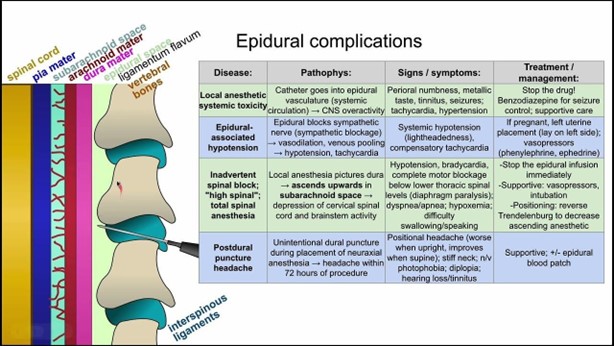A nurse is assisting with the care of a client who is receiving a spinal epidural to treat a herniated disc.
Which of the following findings should the nurse identify as an indicator of unrelieved pain?
Urinary retention
Constipation
Difficulty swallowing
Restlessness
The Correct Answer is D
Restlessness can be an indicator of unrelieved pain in a client who is receiving a spinal epidural to treat a herniated disc. Restlessness is often a manifestation of discomfort or agitation, which can be caused by inadequate pain management. When a client's pain is not adequately relieved, they may exhibit restlessness as they try to find a more comfortable position or seek relief from the discomfort.
Urinary retention (option A) is incorrect because it can be a side effect of certain medications used in pain management, such as opioids, but it is not a specific indicator of unrelieved pain. It is important to monitor for urinary retention as a potential complication of spinal epidural anaesthesia, but it is not directly related to pain relief.
Constipation (option B) is incorrect because it is another possible side effect of opioid medications, but it is not a specific indicator of unrelieved pain. It is important to address constipation as a potential adverse effect of pain management, but it is not a direct indicator of pain relief.
Difficulty swallowing (option C) is incorrect because it is not a common indicator of unrelieved pain in the context of a spinal epidural. It may be associated with other conditions or complications but is not specifically related to pain relief.

Nursing Test Bank
Naxlex Comprehensive Predictor Exams
Related Questions
Correct Answer is C
Explanation
Tell the APS to stop the conversation.
Respecting and maintaining client confidentiality are an essential ethical and legal responsibility for healthcare professionals. When a nurse overhears APs discussing a client's information inappropriately, it is important to intervene and address the situation to protect the client's privacy. Option C, telling the APs to stop the conversation, is the appropriate initial action to take.
informing the client of the APs' actions in (option A), may not be necessary or appropriate unless the client's participation or consent is required due to the nature of the conversation or potential harm caused.
submitting an incident report to the risk manager in (option B), might be considered if the incident is significant or if the inappropriate conversation continues despite intervention. Incident reports are often used to document and address any potential breaches of client confidentiality.
documenting the event in the client's progress notes in (option D), may not be the primary action to take in this situation. While documentation of the incident may be necessary, addressing and stopping the inappropriate conversation should be the immediate priority.
In summary, when a nurse overhears APs discussing a client, the nurse should first intervene and tell the APs to stop the conversation to protect the client's confidentiality and privacy. Further actions, such as submitting an incident report or documenting the event, may be appropriate depending on the severity and ongoing nature of the situation.
Correct Answer is ["C","D","E","F"]
Explanation
Case management can be beneficial in situations involving assault to help coordinate and provide ongoing support and resources for the client. This intervention is appropriate in this scenario.
Ensuring a safe and private environment is crucial to protect the client's confidentiality and provide a supportive atmosphere during this difficult time. This intervention is necessary.
Since the client reports being assaulted and has sore genitals, it is important to consider the risk of sexually transmitted infections (STIs). Administering STI prophylaxis can help prevent potential infections.
The client may benefit from additional support services such as counseling or support groups. Providing resources for local support services can help the client access the necessary help and support they need.
Contacting children and youth services is not applicable in this scenario as the client is a full-time college student and not a child or youth.
While the client mentioned drinking, it is not explicitly stated that they have an alcohol addiction or problem. Therefore, providing resources for Alcoholics Anonymous may not be the most appropriate intervention at this time.
Whether you are a student looking to ace your exams or a practicing nurse seeking to enhance your expertise , our nursing education contents will empower you with the confidence and competence to make a difference in the lives of patients and become a respected leader in the healthcare field.
Visit Naxlex, invest in your future and unlock endless possibilities with our unparalleled nursing education contents today
Report Wrong Answer on the Current Question
Do you disagree with the answer? If yes, what is your expected answer? Explain.
Kindly be descriptive with the issue you are facing.
